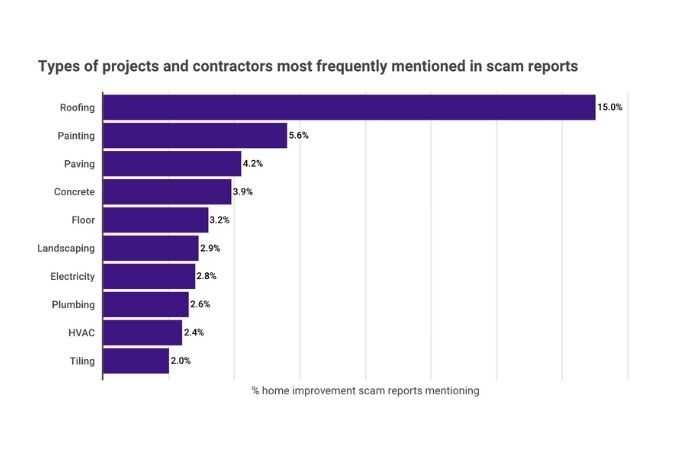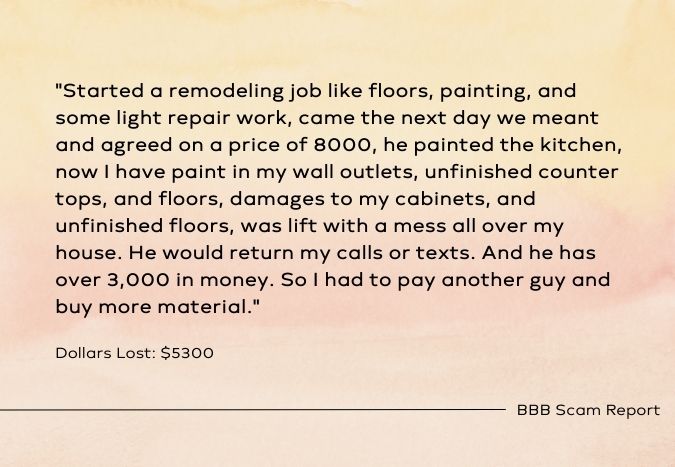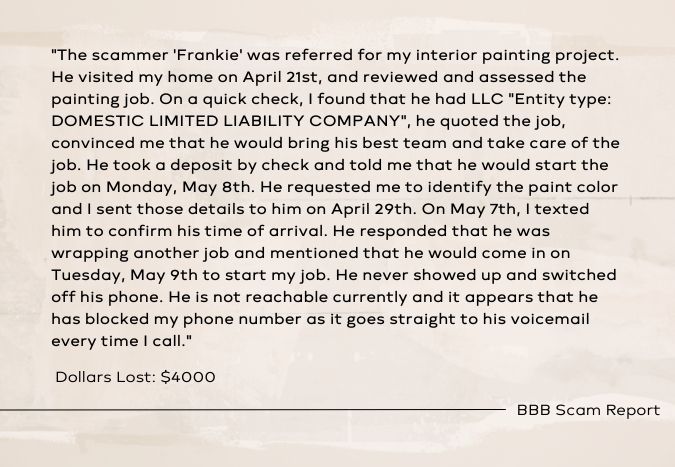
How To Hire A Trusted Home Improvement Contractor
Posted on July 21, 2023
According to the Better Business Bureau (BBB) Scam Tracker and the FTC, home improvement scams average 300,000 per year; that’s $740 million annually. When compared to other fraudulent reports, home improvement scams are far more costly.

Home improvement painting projects are second-leading compared to other home improvement scam incidents, making up over 5% of all fraudulent reports.

Georgia has 11,000 home improvement scams annually, well above the national state average (the per-state average is 6,000).

Unfortunately, many of these fraudulent contractors may come across as competent and personable until you realize you’ve been scammed, and it’s too late to recoup your time and money. Here are some actual scam reports reported to BBB.



You don’t have to be a statistic. There are foolproof tips you can follow that will help you hire a trustworthy professional contractor. You’re going to want to write this down!
BEWARE OF GENERAL QUOTES
Use caution if a contractor provides you with a general quote; this is a red flag. Quotes should be calculated and provided in printed format with a detailed breakdown of estimated costs. Quotes should not be arbitrary; there should be a uniform and scientific approach to calculating estimates. Also, beware of lowball estimates. It falls into that age-old saying, “If something sounds too good to be true, it probably is,” and it will cost you more in the long run.
If you are provided with a general quote, request a detailed breakdown. If something doesn’t add up or feel right, move on and find another contractor that can provide you with a detailed breakdown of costs.
PROOF OF INSURANCE IS A MUST
Ensure that any home improvement contractor you are considering working with has insurance. At the bare minimum, they should have General Liability coverage and Workers Compensation. Ask your potential contractor to send a copy of their insurance when they send you the proposal. Contact their insurance company to understand your liability and protection coverage. This also comes into handy if you ever have to file a claim, you can contact their insurance company directly. If the contractor refuses to send a copy of their insurance with the proposal or doesn’t have insurance, do not work with them. It’s not worth the risk or personal liability.
UNDERSTAND THE WARRANTY COVERAGE
You’ll want to know the warranty coverage for any home improvement project upfront. Request a copy or a link to review their warranty terms and conditions so you understand your coverage, guarantee, time limitations, and recourse should something go wrong. Gauge your comfort level with their warranty coverage, if you’re not happy with their coverage, don’t use them.
AVOID DOWN PAYMENTS
For smaller home improvement projects, like painting, which are 80% labor and 20% materials, you should never need to provide a contractor with a down payment. As you read in the scam above, the scammers all requested a down payment. If a painting contractor requests a down payment, move on and keep looking for another contractor.
APPEARANCE MATTERS
Contrary to popular belief, you should judge a book by its cover, especially when it comes to home improvement contractors. Pay close attention to their vehicle when they come to your home. Is it branded? Is it in good condition?
Also, who is taking the estimate? Is it the worker? The owner? Or is it a sales representative? They should be dressed professionally and appropriately based on their role in the company.
DO YOUR DUE DILIGENCE
Take the time to research the home improvement business you’re considering, review their online reviews, and talk to your neighbors and ask who they use and recommend. Ask the contractor which stores they operate out of and contact the store and ask their opinion and experience working with them. You can even look up companies on the BBB website to see if they have been accused of fraudulent activity. We recommend interviewing and receiving proposals from at least three contractors so that you can select the best one for the project.
GET IN THEIR BUSINESS
You should ask potential contractors a lot of questions. You’ll want to be able to understand their business, process, timeline, and what your expectations should be. Home improvement projects can be invasive, time-consuming, and costly, so ensure you are letting the right people in your home. Here are some questions you may want to ask:
- Can you explain your process?
- Who will be working on this project?
- How many people should I expect in my house and for how long?
- What are my expectations for clean-up?
- What are my expectations for covering my house
- What is this project going to feel like?
- What if I don’t like the prep work? What are my rights?
Your home is an appreciating asset. When done right, home improvement projects maintain or even improve your home value. When done wrong, it can cost you more than your money; it can be emotionally exhausting and devalue your home. Fortunately, there are professional, trustworthy home improvement companies, and now with these tips in hand, you’ll be able to decipher the professionals from the scammers.






